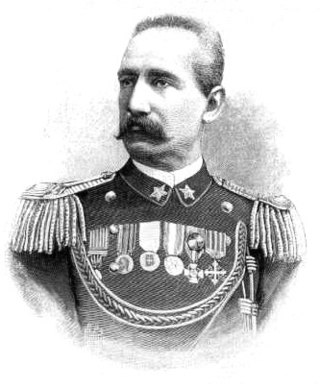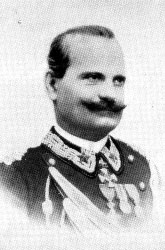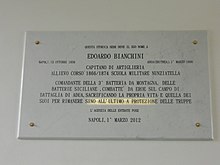
The Battle of Adwa was the climactic battle of the First Italo-Ethiopian War. The Ethiopian forces defeated the Italian invading force on Sunday 1 March 1896, near the town of Adwa. The decisive victory thwarted the campaign of the Kingdom of Italy to expand its colonial empire in the Horn of Africa. By the end of the 19th century, European powers had carved up almost all of Africa after the Berlin Conference; only Ethiopia and Liberia still maintained their independence. Adwa became a pre-eminent symbol of pan-Africanism and secured Ethiopian sovereignty until the Second Italo-Ethiopian War forty years later.

The Alpini are the Italian Army's specialist mountain infantry. Part of the army's infantry corps, the speciality distinguished itself in combat during World War I and World War II. Currently the active Alpini units are organized in two operational brigades, which are subordinate to the Alpine Troops Headquarters. The Alpini's name comes from their inceptive association with the Alps, the mountain range that Italy shares with France, Switzerland, Austria, and Slovenia. An individual soldier of the Alpini is called Alpino.

The Nunziatella Military School of Naples, Italy, founded November 18, 1787 under the name of Royal Military Academy, is the oldest Italian institution of military education among those still operating. Its building, familiarly called "Red Manor", and the adjacent church of the Santissima Annunziata, is an architectural monument of the city of Naples.
The Gold Medal of Military Valour is an Italian medal established on 21 May 1793 by King Victor Amadeus III of Sardinia for deeds of outstanding gallantry in war by junior officers and soldiers.

Giuseppe Galliano was an officer of the Royal Italian Army, mostly known for his role during the First Italo-Ethiopian War. He perished in the Battle of Adwa and was posthumously awarded the Gold Medal of Military Valour.
The article provides an overview of the entire chain of command and organization of the Italian Army after the reform of 1 October 2016 and includes all active units as of 1 July 2019. The Armed Forces of Italy are under the command of the Italian Supreme Defense Council, presided over by the President of the Italian Republic. The Italian Army is commanded by the Chief of the Army General Staff or "Capo di Stato Maggiore dell’Esercito" in Rome.

Giovanni Romero was an Italian colonel who participated in several conflicts during the 19th century. He participated in the Second Italian War of Independence and the Third Italian War of Independence, most notably leading the 4th Africa Infantry Regiment during the Battle of Adwa of the First Italo-Ethiopian War before being killed at the battle. Romero was also a posthumous recipient of the Gold Medal of Military Valour.

Giuseppe Edoardo Arimondi, OSML, OMS, OCI was an Italian general, mostly known for his role during the First Italo-Ethiopian War. He was one of the few European commanders who gained a victory over the Mahdists before Kitchener's Expedition, soundly defeating them at Agordat in 1893. After a long and successful colonial service, he died in combat at Adwa, and was posthumously awarded the Gold Medal of Military Valor.

Matteo Francesco AlbertoneOCI was an Italian general, mostly known for his role during the First Italo-Ethiopian War. He led the Native Brigade during the battle of Adwa and was taken prisoner by the Ethiopians.

Vittorio Emanuele Dabormida, 2nd Count Dabormida, OSML, OCI was an Italian general and noble, mostly known for his role during the First Italo-Ethiopian War. He died in combat at Adwa, and was posthumously awarded the Gold Medal of Military Valor.

Giovanni Esposito was an Italian general during World War II and a recipient of the Gold Medal of Military Valor. He commanded the 5th Alpine Division "Pusteria" in 1941–1942, and the territorial defense of Trieste from 1943 to 1945, joining the Italian Social Republic.

Domenico Turitto was an Italian major who was part of the Royal Colonial Corps of Eritrea. He participated in the Mahdist War as he commanded the 1st Indigenous Infantry Battalion, occupying the city of Kassala and distinguishing himself at the Battle of Kassala. During the First Italo-Ethiopian War, Turitto commanded the vanguard of the Indigenous brigade under the command of Matteo Albertone before being killed in the battle. He was also a recipient of the Silver and Bronze Medals of Military Valor and a knight of the Order of Saints Maurice and Lazarus.
Maurizio Lazzaro de Castiglioni was an Italian general during World War II. From 1940 to 1942 he was head of the Operations Office of the General Staff of the Royal Italian Army. After the war he became commander of the Allied Land Forces Southern Europe in 1951–1952.
Amedeo De Cia was an Italian general during World War II.

Umberto Masotto was an Italian Captain who served in the First Italo-Ethiopian War. He commanded the 4th Mountain Artillery Battery during the Battle of Adwa but was more famously known for being the first field gunner to receive the Gold Medal of Military Valour.

Davide Menini was an Italian Lieutenant Colonel of the First Italo-Ethiopian War. He participated in the Battle of Custoza of the Third Italian War of Independence and commanded the 1st Africa Alpini Battalion during the Battle of Adwa before being killed in the battle.

Francesco De Rosa was an Italian major of the First Italo-Ethiopian War. He commanded the 1st Artillery Brigade during the Battle of Adwa and was a posthumous recipient of the Gold Medal of Military Valor for his brave service in the battle before being killed in action.

Leopoldo Cesare Prato was an Italian major of the First Italo-Ethiopian War. He commanded the 6th African Infantry Battalion during the Battle of Adwa before being killed in the battle. He was also a posthumous recipient of the Gold Medal of Military Valor for his service in the battle.

Giuseppe Antonio Baudoin was an Italian major of the Third Italian War of Independence and the First Italo-Ethiopian War. He commanded the 9th Africa Infantry Battalion during the Battle of Adwa before being killed in the battle. He was a posthumous recipient of the Gold Medal of Military Valor for his service in the battle.

Antonino Di Giorgio was an Italian general and politician, who fought in the First Italo-Ethiopian War, the Italo-Turkish War and the First World War, and served as Minister of War of the Kingdom of Italy from April 1924 to April 1925. He resigned after the rejection of his plan for a radical reform of the Royal Italian Army.

















